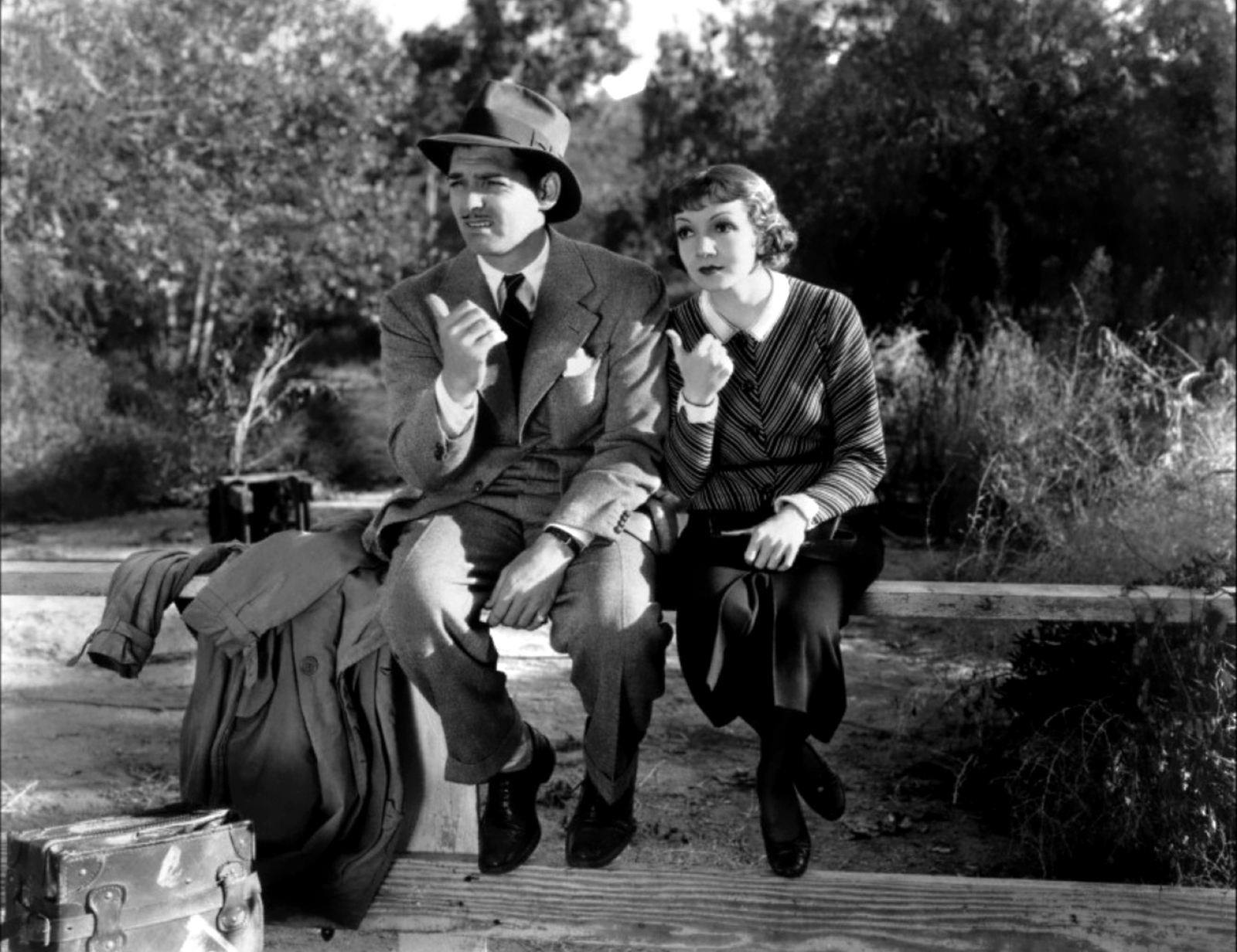New Again: Frank Capra
You cannot discuss 20th-century American cinema without mentioning director Frank Capra. Born in Sicily, Francesco Capra immigrated to the US as a child and released his first full-length film in 1926. Over his near-40-year career, he mastered the “screwball comedy” and was nominated for six Oscars (he won three). Through his most famous films—It Happened One Night (which, if you haven’t seen, you might recognize from Sex and the City), the hilarious Arsenic and Old Lace, Depression-comedy You Can’t Take it With You, and little-man-triumph films Mr. Deeds Goes to Town and Mr. Smith Goes to Washington—he was an instrumental force in the careers of Clark Gable, Jimmy Stewart, Jean Arthur, and Gary Cooper. Capra’s first film after WWII, and his most celebrated, is the festive ghosts-of-Christmas-pasts It’s a Wonderful Life.
Last month, Star Partners announced its plan to create a sequel to the film, focusing on the grandchild of Jimmy Stewart’s character, protagonist George Bailey. In typical Hollywood fashion, Paramount, which owns the rights to the 1946 original, has threatened to sue should the project go ahead.
We met Frank Capra after he had retired from the film industry in the spring of 1972. Our discussion ranged from his views on the youth of the ’70s to how his films changed after the War. —Emma Brown
Mr. Capra Goes To College
By Andrew Bressan and Michael Moran
This interview was compiled from two meetings. We met Mr. Capra at the General Press Conference in Dallas and then had an extended private interview a few days later during the USA Festival.
INTERVIEW: Has there been any reaction to your films at festivals and revivals that has surprised you?
FRANK CAPRA: The reaction that has surprised me the most on the campuses is that the values in my films are somehow related to the values that students seek today. And they are a little bit astonished that somebody 30 years ago was making protest films.
INTERVIEW: Are you satisfied with the trends in movies today?
CAPRA: Well, satisfying me is not the most important thing in the world. I’m satisfied in the way that they are trying to be contemporary. They should be contemporary with their times as mine were with my times. In that sense I’m satisfied. But I think they are neglecting stories for shock. I don’t like that very much.
INTERVIEW: By shock, you mean violence and sex?
CAPRA: Yes, rather than stories—but that will soon wear out. You see, the screen is much freer than when I was making films and I think that is a good thing. We’ll just have to pay more attention to making real, human stories about people—not peep shows.
INTERVIEW: What do you do these days?
CAPRA: Going around to universities and talking to students. And say to them the things I’m saying to you right now. And getting a great kick out of it. Glad to be around, alive, and talking to young people.
INTERVIEW: What do you think of film study at colleges and universities?
CAPRA: Well, all you can do is learn the skills of movies. Neither colleges nor anyone else can teach you creativity. They can teach you abilities to work with—you know how to use the gifts you’ve been born with. They can expose you to… look, I’m a living example of getting into films backwards. Merely by accident. Exposure to films and ideas is the best thing that colleges can do.
INTERVIEW: Do you see much idealism in today’s movies?
CAPRA: Not as much as I think you will see later on. I think the medium is so much bigger than the people who are in it. It’s a new art form—it’s only 50 years old. It encompasses all the other classical art forms. It uses them as tools. So it really takes a broad artist—like a Shakespeare—to really make use of film.
INTERVIEW: Are you satisfied looking at your films today?
CAPRA: Well, one is never completely satisfied. But I can say that I’m not dissatisfied. I’ve been very fortunate. I’ve been given some gifts—to take advantage of the contemporary times when I made movies. Gifts to make audiences laugh.
INTERVIEW: And cry, too.
CAPRA: Yes, but the best way to make friends with an audience is to make them laugh. You don’t get people to laugh unless they surrender—surrender their defenses, their hostilities. And once you make an audience laugh, they’re with you. And they listen to you if you’ve got something to say. I have a theory that if you can make them laugh, they’re your friends.
INTERVIEW: Yes, there’s laughter and hope in your films, but there is also sadness.
CAPRA: Yes, the hurt, the tremendous hurt. The fact that you can be hurt to the point where you can’t recover. But you do. You conquer even with the worst kind of hurts, and knocking down, down to nothing. Stripped of dignity, everything, and still the individual comes back. He still can reach down somewhere in his inner resources and come back. Bounce. I think if you don’t have sadness—then you get Pollyanna completely.
INTERVIEW: You’ve been called that very thing.
CAPRA: Man must be able to recover, to win out, triumph over adversity. And I don’t mean just the little adversity like paying his room rent or something. But those deep, deep human adversities because something he has faith in has turned to ashes. Where someone he loves turns out to be just another joke. You get to the point of suicide. But you can bounce back—they can’t completely destroy you.
INTERVIEW: Watching Mr. Deeds Goes to Town (1936) yesterday, I wondered what you were reacting against, in the industry, in the country, when you made it?
CAPRA: Well, there’s always the fear of those that are in that you mustn’t stir, mustn’t make waves. That it will be bad for the country. Mr. Deeds was against mass conformity of any kind. Against mass institutions. That man was being made into an ort. I violently object to that. Man is a unique individual. He can never be put in a system where he becomes just another notch. Another nail.
INTERVIEW: Did you feel confined in the studio system?
CAPRA: Everybody who works under any system feels confined. It is a natural reaction. You are confined to a certain extent. You are confined if you work in a bank, if you paint. You are confined, in a sense, to your art—the enclosure of your mind. Everybody should break out.
INTERVIEW: How long did you work on Deeds?
CAPRA: I shot Deeds fast. I wanted to capture everything I could as fast as we could. I avoided the long delays between set-ups and takes. It got people out of mood. I’m not perfectly sure, around 45 days. We even started shooting without a leading lady. We were shooting those scenes in Mandrake Falls and getting a little panicky. Then I passed by a projection room and heard Jean Arthur.
INTERVIEW: What about the script?
CAPRA: Mr. Deeds was the first picture where we tried to talk about social things—social comment. Not just entertainment. We worked on the script a long time. The picture was shot right to the script. Oh, I added things like when Jean Arthur throws the quarter up in the air. We were trying to say something about the love of man for his fellow man.
INTERVIEW: Of all your films, the ending of Mr. Deeds seems the most reasonable. The hope coming out of the material organically.
CAPRA: I think there is the same kind of ending in Mr. Smith Goes to Washington (1939). There, it may not be carried far, you know logically, but it is the same kind of ending—the triumph of the individual.
INTERVIEW: What about the ending of Mr. Smith. Why did you change it?
CAPRA: Well, we shot the scenes with Smith going home. And the kids give him a big parade. Even Claude Rains joins him. But it was anti-climactic.
INTERVIEW: In 1939, did preview audiences react the ending poorly? Wasn’t the message of the film altered by this scissoring off?
CAPRA: No. It was an elimination—not a change. We ended it sooner, that’s all. It was not a new ending. When Claude Rains confesses you know the score. We just felt it was anti-climactic. You know it went down hill. You see when people kick up their hats and start to go, you must see it, end it before they do that.
INTERVIEW: I think the endings of Deeds and Smith are different. The powers they are fighting…
CAPRA: Well, yes, they are more massive. They’re on a bigger scale. Mr. Deeds is on a small scale. When you get to political machines that can control a state, then you’re really into organized crime—almost. You’re fighting a political mafia.
INTERVIEW: When Deeds came out, some critics said it was pro-New Deal, others figured you were anti-New Deal.
CAPRA: Well, I just want to tell you that most ideologies of the world are not for the individual. They’re against the individual. Communism, fascism. Any kind of an ism—almost—they’re against the individual.
INTERVIEW: How about capitalism?
CAPRA: Capitalism is not really against the individual. Capitalism is supposedly free enterprise. Supposedly about the free individual. But capitalism itself is so massive that the guy on the street gets caught in paying rent, taxes, and he doesn’t own himself at all. You Can’t Take It With You (1938) is against the abuse of capitalism. Because making money, getting yourself status in this world is not everything at all. But it has become everything in America. That you really have to get going and keep up with the Jones’. Get a house and a car and other things. And pretty soon you’re stymied. Things own you. That’s the trouble with capitalism. Things own you. With communism and fascism—ideas own you. One idea and you can’t have any other. Deeds was a statement against all the isms in which the individual is captive and not allowed to be free. This is why you get knocks on every side with this kind of stuff. Most of these ideologies are not based on the individual—no matter what they say. There are these peoples’ democracies, nationalism—they’re all dictatorships. And I think any kind of dictatorship is bad for the individual. That’s one of the reasons why my pictures have been knocked from all sides. But loved by the people.
INTERVIEW: Clearly, your films had a dream, a vision of America behind them. Do you think the dream has changed?
CAPRA: That could be best asked of the young people of today, not of me. In a sense, I’m just a bystander with the young people. I’m not truly a representative that could speak for them. But in general, I think that dream is still there, and still viable. I think the world would be terrible place without hope. A terrible place without the idea that things are going to get better. I was shocked by that film Journey Thru Rosebud. Shocked to see that Indian culture and white culture could seemingly never come together. And if that is so, and I don’t think it is, then one culture must destroy the other. That’s all. They can’t live together. And this then is very hopeless.
INTERVIEW: But hasn’t this happened in fact? Dwindling numbers of Indians. Their culture weakened, their traditions abandoned?
CAPRA: Yes. But if we take the number, the variety of people that have come to the United States—that have become Americans, you’d be surprised at the number of cultures that have joined together here. We are a product of many. We’re not British, German, Italian, or Chinese. We’re a conglomerate, a melting pot. We’ve got our own culture. You look and someone will be named Moretti, or Zimmerman, or Zukowski—and they’re all Americans. So I don’t believe that culture has such bars around it.
INTERVIEW: Critics have usually parted company with you when it comes to this faith in America and the individual.
CAPRA: There are a lot of people who believe that the individual can’t make it himself. And that’s why people want to join up in various herds—herd formation. So you become part of a herd, a group. Group power of some kind. There’s an awful lot of group power people in our country today. Black power, Chinese power, Indian power, woman power. Everyone is putting in together…
INTERVIEW: Money power?
CAPRA: Money power too. Getting together to fight other powers not as individuals but as groups.
INTERVIEW: How did you ever survive your stint in the military? Taking orders! Making propaganda films!
CAPRA: It was difficult for me to function. I felt very uneasy in the military. Any kind of dictatorship, I’m uneasy. I just don’t like dictators. I don’t like crowds. I don’t like hordes, and I don’t like other people telling me what to do. This is probably a reaction against people telling me what to do when I was a kid. I won’t join any group, espouse a cause against some other people.
INTERVIEW: Yet you helped found the Directors’ Guild. You were one of its guiding founders. You wrote that famous letter to the Times.
CAPRA: Yes I can do it—if I’m working as an individual. It’s difficult to say. I like to be free. And I championed the cause of freedom even against my own kind. It’s difficult today because the world is organized. I think it is General Electric that says “Progress is our most important product.” I don’t agree with that. In a way, I think progress can be our most debilitating product. Because our technology has gone way beyond our ability to handle it. It is sending us off into strange alleys seeking only material values. Freedom may be a lost cause. God, I think the human spirit is a real powerful spirit. It has no limits and it has no ends. And I hate to see it put in any kind of box—pink or green.
INTERVIEW: Your films changed after you returned from military duty.
CAPRA: Well, I came back a fighting pacifist—I really did—war to me was the stupidest way of settling anything. I saw examples of this in London. I went through some bombings where people had to rush out and go underground. And I rushed out and I thought the bombs weren’t going to hurt me because I wasn’t English. I ran across people —women cowering in their hallways with their children. The whole damn thing goes to pieces. I thought there must be some better way—and I knew damn well that the German women were cowering on the other side.
INTERVIEW: Why do you come down so heavily on peace demonstrations and draft resistors in your book?
CAPRA: Well, I think that holding up little cards—going around holding up little cards with stupid things, stupid little slogans on them to me is… well, with youth doing that. Youth, to me, is the flower… Youth to me is Ralph Nader. Now dammit, he’s doing things. By himself. He’s making government quail. He’s making industry quail. And he set it up by himself. He’s Mr. Smith— today! And he is happening today—so the power of the individual has not gone.
INTERVIEW: The average draftee can’t face the whole government induction mechanism alone. I don’t understand…
CAPRA: Well, maybe I’m a bigot even about the individual. I have a feeling that demonstrations don’t accomplish anything. That they become fads. That everyone just took a card up and demonstrated. I also felt that these demonstrations wouldn’t go on unless there was a TV camera there. That part of it all was performance for the media. I got the feeling that I didn’t know whether it was completely honest.
INTERVIEW: But you practically created our World War II propaganda films, helping one conglomerate to fight another.
CAPRA: Yes and I also know that to fight conglomerates you have to build a union as I did. I know that—but I was doing that as an individual. I feel that youth should have more imaginative ways of doing things. Fighting these things. And another thing, I read that young people are not going for the vote business as they should. They’re not even signing up. And I wonder what the hell will arouse them? What does youth want? Do they want to be babied all their lives? Don’t they even want to suffer, work, and sweat? I mean, I don’t know. Have they lost their courage?
INTERVIEW: I don’t think so.
CAPRA: Well that’s fine; sometimes, I get a feeling that the courage is gone. And I hate to see a group of kids all doing the same thing and accomplishing very little. They should use their imaginations in getting things done. I love young people right now—really I do. And it is sort of a new found love. I’ve been around campuses. And perhaps—you know Providence moves in very strange ways that we don’t understand because we’re ignorant of spiritual, human values, but it could be possible that this generation and possibly the net will make war so unpalatable that it will be abandoned completely. If youth of today has accomplished that—will accomplish that!—I think it will be not the lost generation but the blessed generation. There are many who think that war will never be abandoned. That man’s greatest advances are weapon advances. Like in African Genesis. That culture follows from weaponry, that we are militant like the animals and birds—defending our homes. But no matter how far back you go in history, along with the struggle for existence, along with the survival necessities—kill or be killed, eat or be eaten—there is a hunger (in the lowest Aborigine) for something spiritual. He invents God, prayers, incantations to something above him. Why? This is not brought out—this is not weapon culture.
INTERVIEW: This spiritualism, this mysticism is in your book, films, this interview.
CAPRA: Well, I know this hunger—it is the hunger in the old, the new, in what, to us, is the savage. There is this yearning for something, to be part of something, to be associated with something that is above and beyond our ken is deep within the human breast. Why? Is that part of the genes? Did that come out of a survival conflict? It is a strange hunger I think people have. And they react to it on the screen. I can tell by audiences. This hits them. And so when you ask: Are these values still meaningful today? I think they are. It still reaches audiences. After all these are mirror values. They reflect what’s inside you. If you haven’t got your own mirror, they will leave you cold.
INTERVIEW: You were raised a Roman Catholic?
CAPRA: Well, I was in and out of churches. That didn’t mean a heck of a lot to me! I finally ended up a pretty good Catholic. But for years I didn’t go near a church.
INTERVIEW: You’ve been called a Christian humanist, a pessimist. Were your heroes like Deeds and Smith modeled after Jesus?
CAPRA: Well, I happen to think that Jesus was the greatest hero of all time. I don’t think you could invent that kind of a hero. He had it all—everything that the human spirit could yearn for. There is nothing that man ever said or did, by word or deed that is evil. That is not full of compassion. That is not full of love for your neighbor whether he’s down or out, or up—no matter what. He taught that you must love your neighbor whether he’s a crook, a beggar, whether he’s rich or poor.
INTERVIEW: What about the hero in your film The Bitter Tea of General Yen (1933)? Was he a typical Capra character?
CAPRA: You see the big story of that film was the miscegenation. Thirty years ago that was a dirty word. Yes, General Yen was really a big hero. Stanwyck falls in love with him and she finally goes to give herself to him. But he won’t have her.
INTERVIEW: He’s the only one of your heroes that dies.
CAPRA: Yes, in a way, he gets crucified.
INTERVIEW: Did you consider a similar ending for Meet Jon Doe (1941)?
CAPRA: Oh my yes, one of the endings had John Doe leaping off—everybody said let him jump!
INTERVIEW: Why didn’t you choose that ending?
CAPRA: Because I thought it was defeat. Suicide is defeat. Especially since it is forced upon him. To me it was defeat. I just couldn’t find anyway which victory for that idea could come out of his leaping. I know it would have been exciting. Dramatic. A punch in the nose.
INTERVIEW: Perhaps more real to the audience.
CAPRA: Perhaps more real to the people watching, but not more real to me.
INTERVIEW: Some critics faulted you about the ending claiming you didn’t kill John Doe because it would have meant bad box office.
CAPRA: Oh, the hell with the box office. Boy—if I had paid any attention to the box office I wouldn’t have been worried so much about endings. Listen if it didn’t suit me…
INTERVIEW: Why didn’t you stick with the original ending of Meet John Doe, where Doe wins and converts the villains at the fade out like Deeds and Smith?
CAPRA: The trouble was, here we didn’t start with a Mr. Deeds or Mr. Smith. We started with a bum who had no value whatsoever.
INTERVIEW: But he does get them.
CAPRA: Yes, but he gets them by fakery. He’s a fake. And that’s why we wrote ourselves into a corner. He was a fake to begin with. He did those things—he accepted the good clothes and everything else. It was when the idea began to reach him—when he saw how powerful it was—but now, he’s a fake. What can he do? He hasn’t confessed. He hasn’t changed really…He’s kinda changed but…
INTERVIEW: It’s still insolvable.
CAPRA: Well we shot five endings—released four. And the ending that was finally put into the picture was sent to me by a letter. It said only the John Does can keep him from doing that—and it was right. But it is still not the proper ending.
INTERVIEW: You said Deeds was shot close to the script, how about It Happened One Night (1934)?
CAPRA: Well it was a slap happy show. Everybody got into the thing. This feeling crystalizes into gags. Ad libs are the best laughs. The hitchhiking scene was written but the topper—Colbert lifting her skirt was worked out in the shooting. There’s a scene in the film—piggy-back across a river. Well that’s in because we found a little river and it was that time of day when the light is low and the reflection was… well, it was a beautiful shot. I said, “Let’s take a scene of that.”
INTERVIEW: Crowds figure heavily in your films. How did you cast them?
CAPRA: Well, I cast them very carefully. They have to evoke something in me. I don’t care whether they are actors or not. They have to look like what they are supposed to be. And I have a sense when I see someone in the crowd—if he fits. I have a sixth sense for casting. I just have to see and talk to the actors. I never make tests. I like to work with crowds. I like to get the principals in a crowd. When they do, something else comes off, something special.
INTERVIEW: Would you like to put to rest any myths about Hollywood?
CAPRA: No. I don’t know if you can lay myths to rest or that you should. They are part of the glamour, part of the whole idea— the theatrics—the illusion. Film is universal. All the countries of the world are making films. Hollywood is the only major unsubsidized center for films. To my knowledge all others are at least partially subsidized. I’m glad Hollywood isn’t.
INTERVIEW: Were you surprised to find out (if you did) that your screenwriter for Mr. Smith (Sidney Buchman) belonged to the Communist party when he wrote the script?
CAPRA: Well, I kinda knew he was at the time we worked together. But it was no problem. If you are in charge of your own pictures, you have control. As you notice, I had three or four writers—very good ones—but the pictures all come out looking alike.
INTERVIEW: There is very little mood music in your films.
CAPRA: There’s music in my films but you seldom hear it. Very early I got the idea that the important things in films were people—the actors. They are the intermediary between the director and the audience. They make direct contact. People to people communication. If the audience gets everything else, if they see the photography and notice that it is good, then the story goes out the window, but if you become involved with the lives of the actors and forget that you are seeing mechanical devices on a huge screen—forget the make-believe—this is the job of the director to involve the audience with the actors.
INTERVIEW: When you left Paramount in 1951, what happened? Did you try to make your own special kind of movies again?
CAPRA: I tried. I tried to make films in three places. And the first time I was confronted with a situation I walked away from it. I had lost my courage, you see. Being that kind of an individual, I didn’t want any more fights.
INTERVIEW: If the backing were forthcoming, would we see a new Frank Capra film?
CAPRA: Well I won’t say no—and I won’t say yes. But my no is bigger than my yes.
THIS INTERVIEW INTIALLY APPEARED IN THE JUNE 1972 ISSUE OF INTERVIEW.
New Again runs every Wednesday. For more, click here.







